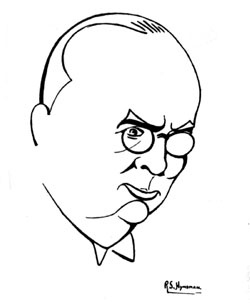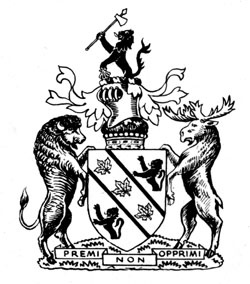
In 1932, liberal politician "Chubby" Power quipped that the Prime Minister of Canada "exhibits the manners of a Chicago policeman and the temperament of a Hollywood actor." Sixty years later, historian Peter Waite agreed that Richard Bedford Bennett probably has the worst reputation of any Canadian prime minister. At the same time, Bennett's magnanimity towards those who approached him with their financial needs was widely known. One estimate suggests that his personal support of charitable organizations was in the area of $25,000 annually, even during the Depression. There are no figures available for the endless stream of $5.00 gifts he made to distraught ordinary individuals who wrote pleading for assistance.
Born July 3, 1870, at Hopewell Hill, N.B., the young R.B. Bennett came from a family of pre-loyalist origin and modest financial means. After a brief period as a teacher and school principal, he studied law at Dalhousie University before beginning practice with L.J. Tweedie of Chatham, N.B. It was during his time in this office that he made the acquaintance of Max Aitken (Lord Beaverbrook) who became his lifelong friend. In 1897, Bennett accepted an offer to become the junior law partner of Senator James Lougheed in Calgary, Alberta. A successful law practice, coupled with shrewd investments and a substantial inheritance from the Estate of Jennie Shirreff Eddy, enabled Bennett to become extremely wealthy.
After a brief, successful foray into territorial and provincial politics, Bennett was first elected to Parliament in 1911 as the member for Calgary West. Although he declined to participate in the Union Government during WWI, he returned to Parliament in the 1925 election and remained until his retirement in 1938. In 1927 he was elected leader of the Conservative Party and automatically became Leader of the Opposition.
Victory in the 1930 federal election made him Prime Minister of Canada. While in this office, Bennett was also Minister of Finance, 1930-32, and Secretary of State for External Affairs, 1930-35. Economic problems stemming from the Depression dominated his time in office. He vigorously promoted a system of empire trade preferences at the Imperial Economic Conference which Canada hosted in 1932. He hoped to penetrate the lucrative British market for raw materials while retaining a measure of protection for Canadian manufacturers. When that failed to achieve the desired results, he turned to legislative means, introducing a package of regulations and controls, popularly known as Bennett's New Deal. Under this rubric, a series of measures were passed aimed at control of competition. Legislation included the Natural Products Marketing Act (1934) and, a year later, the Minimum Wage Act, the Limitation of Hours of Work Act, the Dominion Trade and Industry Act and the Employment and Social Insurance Act. Eventually most of this legislation was disallowed by the British Privy Council as being outside the constitutional powers of the federal government to enact.
In 1935, Bennett's inability to overcome the effects of the Depression led to his defeat in the federal election which marked the return to power of Mackenzie King. Four years later, Bennett retired to Juniper Hill, his English estate, where he lived until his death on June 27, 1947. He received the title of Viscount Bennett of Mickleham, Calgary and Hopewell in 1941.
Bennett Papers
In 1949, Beaverbrook wrote to Ronald Bennett, who had inherited the R.B. Bennett Papers, asking:
May I have Dick's papers for the University of New Brunswick?
If you approve, I propose to deposit them in the new wing of the Library which is now nearing completion. I will also place in the same wing the papers of Bonar Law which he bequeathed to me by will.
It is my proposal that we should gather together many mementoes of the two Prime Ministers from New Brunswick - Bonar Law and Bennett. These mementoes will form an interesting collection for the use of the Province. It will encourage some young man to emulate the example of one or other of our greatest citizens ...
R.B. Bennett's brother was happy to oblige and the papers were deposited at UNB, one of only two collections of prime ministerial papers to be found outside Ottawa. The other, the John Diefenbaker Papers, is at the Diefenbaker Centre, University of Saskatchewan. In due time the Bonar Law Papers also made their way to UNB, but were later returned to England.
The 600,000 items in the Bennett Papers include documents, photographs, artifacts and books reflecting the political and personal life of Richard Bedford Bennett, from 1919-1947, with emphasis on his prime ministership, 1930-35. Divided into four series - political, personal, invitations, and clippings - the documents include correspondence, notes and subject files related to Bennett's political activities, as well as personal business, and family correspondence. In addition to pictures scattered throughout the papers, 700 photographs have been segregated at the end of the collection. Many of the latter are of Bennett with world figures. Artifacts include a number of portraits in oil and charcoal, one by Lawren Harris; silverplate, most notably a series of plates depicting early British monarchs; and commemorative medals and scrolls received on official occasions. Books received from Bennett's library are held as part of the Beaverbrook Rare Book Collection.
From 1965-1976, the Bennett Papers were at the National Archives of Canada for microfilming and indexing. The twenty-four volumes of finding aids produced consist of file titles for all four series and two keyword indexes, one alphabetical and one by volume number.

Viscount Bennett's Coat of Arms
Argent within two bendlets Gules three maple leaves proper all between two deim-lions rampant couped gules. Crest, a demi-lion Gules grapsing in the dexter paw a battle axe in bend sinister Or and resting the sinister paw on an escallop also Gules. Supporters, Dexter a buffalo, sinister a moose, both proper. Motto, To be Pressed not Oppressed.
Beddoe, Alan.
Beddoe's Canadian Heraldry. By Lt. Cdr. Alan Beddoe, F.H.S.C. Rev. by Col. Strome Galloway, F.H.S.C. Belleville, Ontario: Mika Publishing Company, 1981. p. 37.